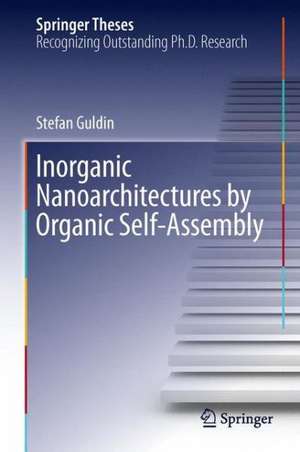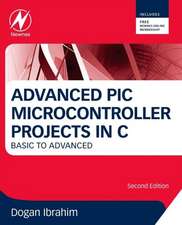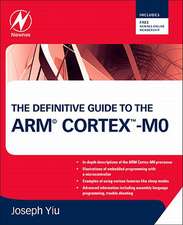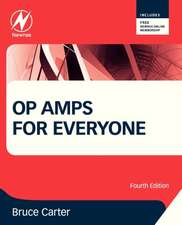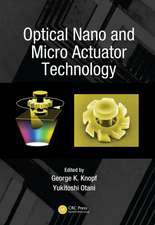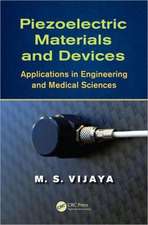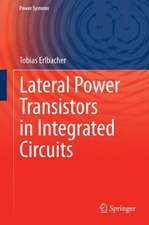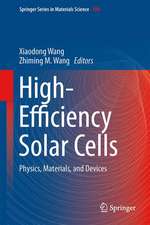Inorganic Nanoarchitectures by Organic Self-Assembly: Springer Theses
Autor Stefan Guldinen Limba Engleză Hardback – 17 iun 2013
| Toate formatele și edițiile | Preț | Express |
|---|---|---|
| Paperback (1) | 635.01 lei 6-8 săpt. | |
| Springer International Publishing – 9 iul 2015 | 635.01 lei 6-8 săpt. | |
| Hardback (1) | 640.06 lei 6-8 săpt. | |
| Springer International Publishing – 17 iun 2013 | 640.06 lei 6-8 săpt. |
Din seria Springer Theses
- 18%
 Preț: 997.88 lei
Preț: 997.88 lei -
 Preț: 389.88 lei
Preț: 389.88 lei - 15%
 Preț: 646.94 lei
Preț: 646.94 lei - 18%
 Preț: 943.43 lei
Preț: 943.43 lei -
 Preț: 399.29 lei
Preț: 399.29 lei - 18%
 Preț: 944.99 lei
Preț: 944.99 lei - 15%
 Preț: 636.80 lei
Preț: 636.80 lei - 18%
 Preț: 941.05 lei
Preț: 941.05 lei - 15%
 Preț: 643.16 lei
Preț: 643.16 lei - 15%
 Preț: 642.68 lei
Preț: 642.68 lei - 18%
 Preț: 1103.62 lei
Preț: 1103.62 lei - 20%
 Preț: 558.83 lei
Preț: 558.83 lei - 18%
 Preț: 1112.30 lei
Preț: 1112.30 lei - 18%
 Preț: 944.19 lei
Preț: 944.19 lei - 18%
 Preț: 1109.92 lei
Preț: 1109.92 lei - 18%
 Preț: 1217.27 lei
Preț: 1217.27 lei - 15%
 Preț: 640.06 lei
Preț: 640.06 lei - 15%
 Preț: 636.45 lei
Preț: 636.45 lei - 15%
 Preț: 640.06 lei
Preț: 640.06 lei - 15%
 Preț: 640.88 lei
Preț: 640.88 lei -
 Preț: 389.70 lei
Preț: 389.70 lei - 20%
 Preț: 563.91 lei
Preț: 563.91 lei -
 Preț: 393.35 lei
Preț: 393.35 lei - 15%
 Preț: 637.93 lei
Preț: 637.93 lei - 15%
 Preț: 641.85 lei
Preț: 641.85 lei - 18%
 Preț: 1225.94 lei
Preț: 1225.94 lei - 20%
 Preț: 551.36 lei
Preț: 551.36 lei - 18%
 Preț: 1229.10 lei
Preț: 1229.10 lei - 15%
 Preț: 639.25 lei
Preț: 639.25 lei - 18%
 Preț: 999.45 lei
Preț: 999.45 lei - 15%
 Preț: 640.06 lei
Preț: 640.06 lei - 18%
 Preț: 1220.45 lei
Preț: 1220.45 lei - 18%
 Preț: 1116.26 lei
Preț: 1116.26 lei - 18%
 Preț: 1110.72 lei
Preț: 1110.72 lei - 18%
 Preț: 1000.87 lei
Preț: 1000.87 lei - 18%
 Preț: 891.17 lei
Preț: 891.17 lei - 15%
 Preț: 640.06 lei
Preț: 640.06 lei - 5%
 Preț: 1154.07 lei
Preț: 1154.07 lei - 15%
 Preț: 635.96 lei
Preț: 635.96 lei - 15%
 Preț: 640.88 lei
Preț: 640.88 lei -
 Preț: 387.20 lei
Preț: 387.20 lei - 18%
 Preț: 1109.92 lei
Preț: 1109.92 lei -
 Preț: 385.25 lei
Preț: 385.25 lei -
 Preț: 385.25 lei
Preț: 385.25 lei - 18%
 Preț: 1112.30 lei
Preț: 1112.30 lei - 18%
 Preț: 999.45 lei
Preț: 999.45 lei -
 Preț: 386.99 lei
Preț: 386.99 lei - 15%
 Preț: 637.13 lei
Preț: 637.13 lei - 20%
 Preț: 554.21 lei
Preț: 554.21 lei - 20%
 Preț: 555.59 lei
Preț: 555.59 lei
Preț: 640.06 lei
Preț vechi: 753.01 lei
-15% Nou
Puncte Express: 960
Preț estimativ în valută:
122.47€ • 127.88$ • 101.13£
122.47€ • 127.88$ • 101.13£
Carte tipărită la comandă
Livrare economică 15-29 aprilie
Preluare comenzi: 021 569.72.76
Specificații
ISBN-13: 9783319003115
ISBN-10: 3319003119
Pagini: 184
Ilustrații: XVII, 165 p.
Dimensiuni: 155 x 235 x 16 mm
Greutate: 0.41 kg
Ediția:2013
Editura: Springer International Publishing
Colecția Springer
Seria Springer Theses
Locul publicării:Cham, Switzerland
ISBN-10: 3319003119
Pagini: 184
Ilustrații: XVII, 165 p.
Dimensiuni: 155 x 235 x 16 mm
Greutate: 0.41 kg
Ediția:2013
Editura: Springer International Publishing
Colecția Springer
Seria Springer Theses
Locul publicării:Cham, Switzerland
Public țintă
ResearchCuprins
From the Contents: Self-Assembly of Soft Matter.- Optical aspects of thin films and interfaces.- Structure-function interplay in dye-sensitised solar cells.- Experimental and analytical techniques.- Block copolymer-induced structure control for inorganic nanomaterials.- Crystal growth in block copolymer-derived mesoporous TiO_2.
Textul de pe ultima copertă
Macromolecular self-assembly - driven by weak, non-covalent, intermolecular forces - is a common principle of structure formation in natural and synthetic organic materials. The variability in material arrangement on the nanometre length scale makes this an ideal way of matching the structure-function demands of photonic and optoelectronic devices. However, suitable soft matter systems typically lack the appropriate photoactivity, conductivity or chemically stability. This thesis explores the implementation of soft matter design principles for inorganic thin film nanoarchitectures. Sacrificial block copolymers and colloids are employed as structure-directing agents for the co-assembly of solution-based inorganic materials, such as TiO_2 and SiO_2. Novel fabrication and characterization methods allow unprecedented control of material formation on the 10 – 500 nm length scale, allowing the design of material architectures with interesting photonic and optoelectronic properties.
Caracteristici
Nominated by the University of Cambridge as an outstanding Ph.D. thesis Novel and unique methods of employing soft matter self-assembly for photonic and optoelectronic devices Extended tutorials on soft matter self-assembly and on optical aspects of thin films and interfaces Includes supplementary material: sn.pub/extras
